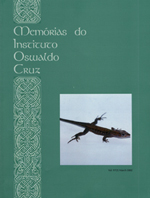
|
Memórias do Instituto Oswaldo Cruz
Fundação Oswaldo Cruz, Fiocruz
ISSN: 1678-8060
EISSN: 1678-8060
Vol. 106, No. 5, 2011, pp. 617-619
|
 Bioline Code: oc11103
Bioline Code: oc11103
Full paper language: English
Document type: Short Communication
Document available free of charge
|
|
|
Memórias do Instituto Oswaldo Cruz, Vol. 106, No. 5, 2011, pp. 617-619
| en |
Lower production of IL-17A and increased susceptibility to Mycobacterium bovis  in mice coinfected with Strongyloides venezuelensis in mice coinfected with Strongyloides venezuelensis 
Dias,Alyria Teixeira; de Castro, Sandra Bertelli Ribeiro; Alves, Caio César Souza; Rezende, Alice Belleigoli; Rodrigues, Michele Fernandes; Machado, Rachel Rocha Pinheiro; Fernandes, Adriana; Corrêa, Deborah Negrão; Teixeira, Henrique Couto & Ferreira, Ana Paula
Abstract
The presence of intestinal helminths can down-regulate the immune response required to control mycobacterial infection. BALB/c mice infected with Mycobacterium bovis following an infection with the intestinal helminth Strongyloides venezuelensis showed reduced interleukin-17A production by lung cells and increased bacterial burden. Also, small granulomas and a high accumulation of cells expressing the inhibitory molecule CTLA-4 were observed in the lung. These data suggest that intestinal helminth infection could have a detrimental effect on the control of tuberculosis (TB) and render coinfected individuals more susceptible to the development of TB.
Keywords
M. bovis, S. venezuelensis, coinfection, IL-17, CTLA-4, tuberculosis
|
| |
© Copyright © 2011 - Instituto Oswaldo Cruz - Fiocruz
Alternative site location: http://memorias.ioc.fiocruz.br
|
|
